Commercial .22 test rigs
Moderators: pilkguns, Marcus, m1963, David Levene, Spencer
Re: Commercial .22 test rigs
I
Last edited by gstarik on Fri Mar 10, 2017 3:21 pm, edited 1 time in total.
Re: Commercial .22 test rigs
Sorry,but not in the next 2 weeks.
I will be in Novisad Serbia starting our workshops at 10.9synergy.
http://109synergy.com
Guy.
I will be in Novisad Serbia starting our workshops at 10.9synergy.
http://109synergy.com
Guy.
Re: Commercial .22 test rigs
Guy, is it this one ? Sorry for the quality of the pic...)I'm using for many years a rig built by a German shooter named Ulli Lind.
It is similar to the Tec Hro rig but more rigid.
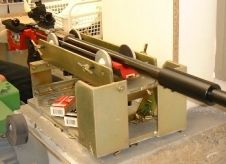
Re: Commercial .22 test rigs
Exactly,that's the one.
but I have changed it. In my rig,the rifle is tightened to the rig at 2 points on the bandstop rail. Shoots much better like that.
Guy.
but I have changed it. In my rig,the rifle is tightened to the rig at 2 points on the bandstop rail. Shoots much better like that.
Guy.
Re: Commercial .22 test rigs
I have my own setup that I put together that works ok with its own quirks. What I have found useful is to put a 24x target scope on the rifle during testing. I put some spots (aiming points) on the back of a target (blank paper) and with the rifle in position I adjust the scope so it points at one of the aiming points. The shots do not go into the aiming point but to the side a little. The scope is checked before each shot to insure it still points at the aiming point to insure nothing is moving.
-
Peter_Scant
- Posts: 79
- Joined: Mon Mar 17, 2008 6:26 pm
- Location: Canada
Re: Commercial .22 test rigs
Thank you Guy/ Paul for that.
Re: Commercial .22 test rigs
Thanks for all the pics and ideas. Guy's idea of a modified leaf spring version to accept equipment rail mounting is interesting and as I assume it's been used to develop and test the tuning tube, it should be a reliable combination. I was always uncomfortable with clamping the sides of the stock.
If anyone has any other personal experience with any test rigs I would be interested to know or see pics.
We're still weighing it all up, but I'll post what we eventually end up with.
If anyone has any other personal experience with any test rigs I would be interested to know or see pics.
We're still weighing it all up, but I'll post what we eventually end up with.
PeteJ
Re: Commercial .22 test rigs
PeteJ,
Here are pics of rests allowing recoil that I found on the web. Some design are amazingly complex...Enjoy !
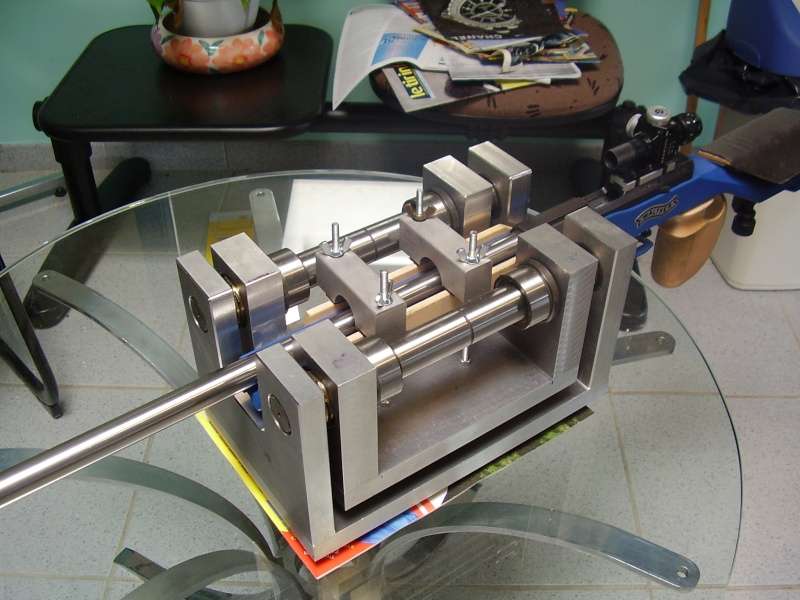

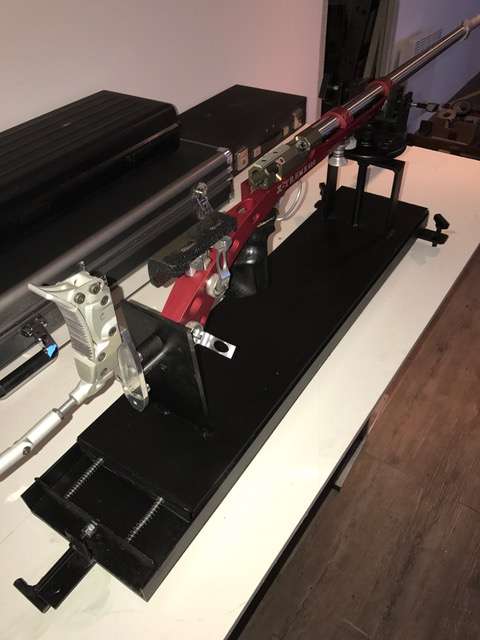
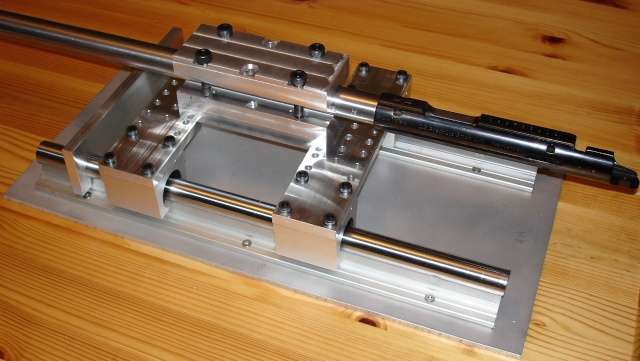
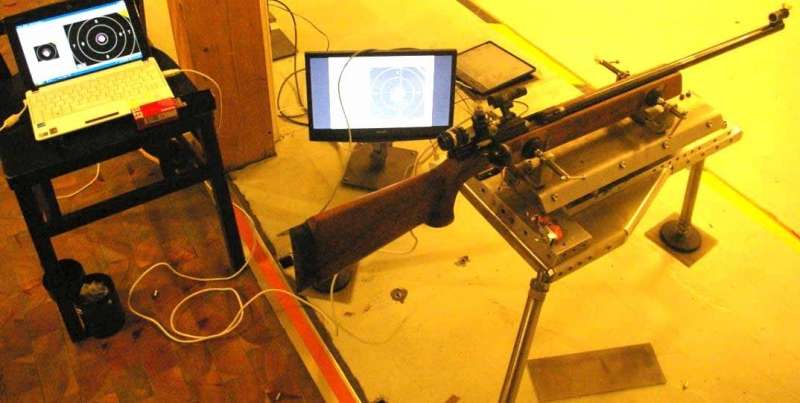
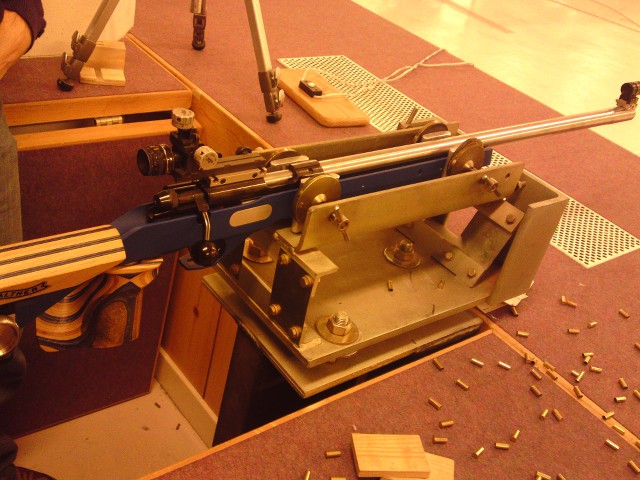
Here are pics of rests allowing recoil that I found on the web. Some design are amazingly complex...Enjoy !






Re: Commercial .22 test rigs
Thanks for the photos. Why go to so much effort if the mount is different from what's used in competition. If you stop the rifle from rotating up as it recoils the results will be invalid. Another that measured vibration and compensation learned that clamping the barrel changed the patterns for a rifle with the receiver bolted in a stock. It did trigger an idea to use my Noptel to verify consist returns to battery and to measure variations in recoil; something to compare with strain gauge measurements.
Re: Commercial .22 test rigs
Certainly clamping the barrel or action in a non-recoiling rig would seem to exaggerate the vibrations of the barrel. My (limited) experience is that testing in such a fashion with a tuner attached produces vertical dispersion that isn't in evidence when shot from the shoulder.patriot wrote:Why go to so much effort if the mount is different from what's used in competition. If you stop the rifle from rotating up as it recoils the results will be invalid. Another that measured vibration and compensation learned that clamping the barrel changed the patterns for a rifle with the receiver bolted in a stock.
With a recoiling rig the barrel should be able to "lose energy" by moving backwards as the bullet travels down the barrel. This could produce a similar vibration to being shot from the shoulder.
As for "moving up under recoil", my observations from live firing using SCATT is that the barrel moves very little in the 2-4mS while the bullet is still in the barrel and that most of the observed recoil happpens once the bullet has left the barrel and is due to the escaping gas. More pertinent might be the inability of the rifle to rotate about the bore axis... or maybe not..?
Of course I may be wrong but I'm looking forward to Pete getting his rig and doing some practical research on tuning.
Re: Commercial .22 test rigs
Others have observed the same, which calls into question ammo testing facilities that remove the action from the stock and clamp the barrel. Time to get my rig built.KennyB wrote:My (limited) experience is that testing in such a fashion with a tuner attached produces vertical dispersion that isn't in evidence when shot from the shoulder.
Mark
-
Peter_Scant
- Posts: 79
- Joined: Mon Mar 17, 2008 6:26 pm
- Location: Canada
Re: Commercial .22 test rigs
If you are trying to tune for positive compensation it is my belief that the rifle needs to be able to rotate. The rifle doesn't need to move much to achieve positive compensation, to move the bullet 5mm at the 50m the muzzle only needs to be moved .06mm at the muzzle for a 600mm barrel rotated about the bolt face.KennyB wrote: As for "moving up under recoil", my observations from live firing using SCATT is that the barrel moves very little in the 2-4mS while the bullet is still in the barrel and that most of the observed recoil happpens once the bullet has left the barrel and is due to the escaping gas.
From the information I've found, I've come to the conclusion that the rotation of the rifle is, at least initially, due to the recoil forces acting around the center of mass of the rifle.
I have got some thoughts on how to test this but unfortunately I don't the time.
Re: Commercial .22 test rigs
Thanks for the compendium of possibilities and thoughts.
Kenny B, seeing as you might be a prime user, what do you think about rotation? That would change a lot in the design... but has anyone proved it makes a difference? Accurate return to battery after rotation with recoil sounds like a minefield. I think barrel clamping is a no no for positive compensation tube tuning and ammo testing, but we've got a leaf spring custom rig lend on offer.
Kenny B, seeing as you might be a prime user, what do you think about rotation? That would change a lot in the design... but has anyone proved it makes a difference? Accurate return to battery after rotation with recoil sounds like a minefield. I think barrel clamping is a no no for positive compensation tube tuning and ammo testing, but we've got a leaf spring custom rig lend on offer.
PeteJ
Re: Commercial .22 test rigs
I have been thinking about the rotation issue, how much does rotation matter as benchrest rigs don't appear to allow for rotation?
Martin
Martin
Re: Commercial .22 test rigs
Back from ISAS Dortmund and some indoor 50m fun... not me unfortunately but a very helpful Anschutz servicing visit instead. I picked up all the catalogues and have to post another rig for the compendium. It's the MEC portable.
Some in depth discussion with people who seem to know gave me the impression that rotation is negligible, so I'm not going to worry about it anymore.
Some in depth discussion with people who seem to know gave me the impression that rotation is negligible, so I'm not going to worry about it anymore.
PeteJ